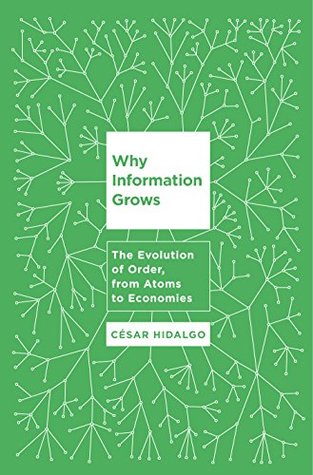More on this book
Community
Kindle Notes & Highlights
Read between
March 29, 2018 - January 19, 2021
ordered structures are
so. Our ability to beget information, and to produce the items, infrastructures, and institutions we associate with prosperity, requires us to battle the steady march toward disorder that characterizes our universe and which troubled Boltzmann.
out-of-equilibrium systems, the accumulation of information in solids, and the ability of matter to compute.
It is the growth of information that unifies the emergence of life with the growth of economies, and the emergence of complexity with the origins of wealth.
by asking what information is and why it grows, we will be exploring not only the evolution of physical order but that of economic order as well. We will be connecting basic physical principles with information theory,
put, knowledge involves relationships or linkages between entities.
Knowhow is different from knowledge because it involves the capacity to perform actions, which is tacit.3
For example, most of us know how to walk, even though we do not know how we walk. Most of us know how to identify and label objects in an image, even though we do not know how we accomplish those perceptual and verbal tasks. Most
So to explain the growth of information in nature and society we will explore the coevolution of physical order and the knowledge and knowhow that allow our universe to beget that physical order.
Suppose that we were asked to arrange the following into categories—distance, mass, electric force, entropy, beauty, melody. I think there are the strongest grounds for placing entropy alongside beauty and melody, and not with the first three.
the challenge of economic development is constrained not only by the duality between matter and information but also by the duality between systems and computation. In society, the latter is the duality between networks of people and their capacity to process information, which we know as knowledge and knowhow.


